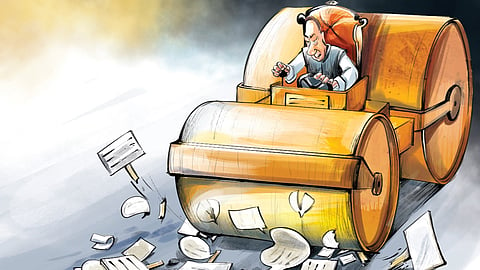

Viksit Bharat is a pipe dream of the pied piper. The question that we have to ask ourselves today is ‘whither Bharat’.
We have much to ponder over. The absence of dialogue between the treasury benches and the opposition, unruly scenes within and outside parliament, jostling for vote-bank politics by seeking to appropriate the legacy of Babasaheb Bhim Rao Ambedkar, feeding the environment of hate, and spouting historical inaccuracies to make unsubstantiated allegations. The toxic environment within parliament has reached a situation in which the chairman of the Rajya Sabha is sought to be removed through a no-confidence motion.
All of these are symptomatic of the decline of an institution that saw stalwarts like Jawaharlal Nehru, Sardar Vallabhbhai Patel, Abul Kalam Azad, Atal Bihari Vajpaye and several others who contributed to civilised discourse within parliament.
The reasons for this institutional atrophy are not far to seek. We have a prime minister who, when abroad, extols the virtues of India’s diversity; but while at home, allows a political agenda seeking to foist a majoritarian culture that vilifies minorities. The accompanying public discourse is also echoed within parliament.
The motive is not far to seek. The vitriol is intended to be an emotive appeal to create a narrative that pitches ‘us’ against ‘them’ in a bid to consolidate Hindu votes. The course of electoral politics today is centred on minorities, who are as much citizens of India as anybody else. Their cultural habits—including what they consume and what they practice under their personal laws—are all matters of public discourse, as if other religions are bereft of any evil. Minority-bashing qua a particular community has become part not just of a social agenda, but integral to the government’s political agenda.
It is in this context that we hear about the country being in dire need of not just a uniform civil code, but of reforming practices of the community that are perceived to be discriminatory, especially qua women. After the Supreme Court frowned upon and ruled against the practice of triple talaq, laws were enacted to make it a criminal offence, visiting the husband with other consequences, including those related to the custody of children. Such laws have been challenged and are pending adjudication in court.
If such a practice was rampant among Muslims, prosecutions launched would be in the public domain. Such agendas have a twofold motivation. One that fuels the majoritarian agenda, and two, that the real issues that concern 1.4 billion people are relegated to the backburner. Otherwise, why should our nation be obsessed with inter-faith marriages only if a Muslim boy marries a Hindu girl?
Personal choices of this nature, protected under our Constitution, are given a communal colour, becoming matters of public discourse. The law requires public objections to be invited in the event of such marriages, abhorrent to all that our republic stands for. I wonder why laws are not enacted to prohibit khap panchayats, whose orders and decisions have no legal sanction. Perhaps, such a step may be politically unwise for the BJP.
Every other day, there is a court proceeding with reference to religious structures that are alleged to have been built by demolishing temples in the past. We also see lumpen elements openly committing acts of violence that are not even investigated. We see individuals belonging to a particular minority community being constantly threatened even during their train journeys; being forced to cancel their sale deeds because the majority community feels that their presence may jeopardise their own security. Even a judge of the Allahabad High Court, at a function organised by the VHP, was brazen enough to extol the virtues of majoritarianism and made unacceptable comments on minorities.
Unsavoury comments are made about the fear of India becoming a Muslim majority nation. Mohan Bhagwat’s statement that we should have three children—when we happen to be the most populous country in the world—suggests that in times to come, the minority will become the majority. We have heard, in the course of election campaigns, dialogues about ‘qabristan’ and ‘shamshaan ghat’ to polarise and exploit public sentiment. Yet, our prime minister calls us the ‘mother of democracy’.
All these are matters of great concern.
Ambedkar once said, “Independence is no doubt a matter of joy. But let us not forget that this independence has thrown on us great responsibilities. By independence, we have lost the excuse of blaming the British for anything going wrong. If hereafter things go wrong, we will have nobody to blame except ourselves. There is a great danger of things going wrong.”
The sequence of events unfolding one after another is an indication of things going terribly wrong in this country. Before democracy can be a thriving force in this country, we need a social revolution to end the blatant discriminatory nature of our caste system. In the absence of such a social revolution, democracy will be in jeopardy. We seem to be flourishing in an environment where the caste and creed have become central to the politics of this country.
These are not times to celebrate 75 years of our Constitution. These are times to ponder and to worry about where this nation is going; how the very foundation of our constitutional culture is being slowly eroded and the nature of our democracy being transformed. We live in fear, worried about government agencies reaching our doorstep to target us, if we protest, with false cases to destroy the gift of freedom that was given to us by the people on November 26, 1950.
This is worse than the Emergency. This nation is being made subservient to the wishes of a chosen few—economic oligarchs who have aggrandised wealth and a political establishment that has ‘bulldozed’ the opposition, publicly stating that they will rule this country for the next 30 years. That too is a pied piper’s dream.
(Views are personal)
(Tweets @KapilSibal)
Kapil Sibal
Member of the Rajya Sabha, former Union cabinet minister and senior advocate